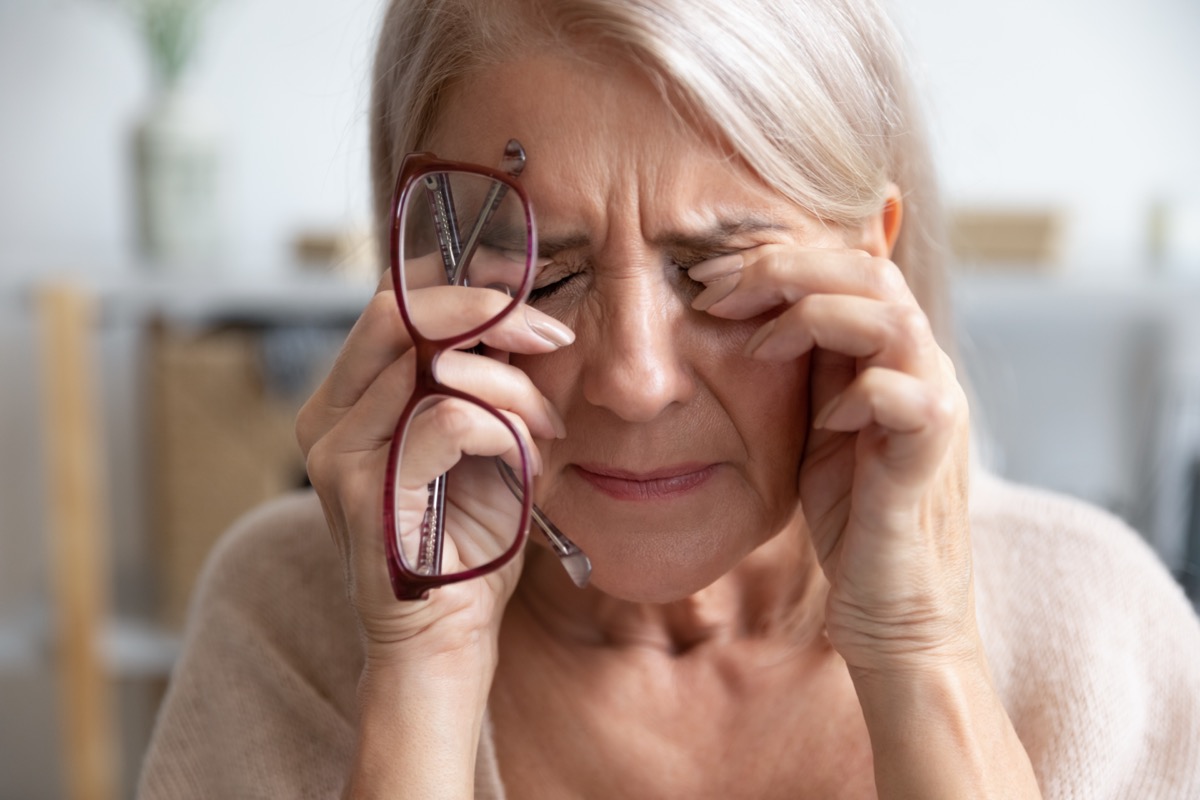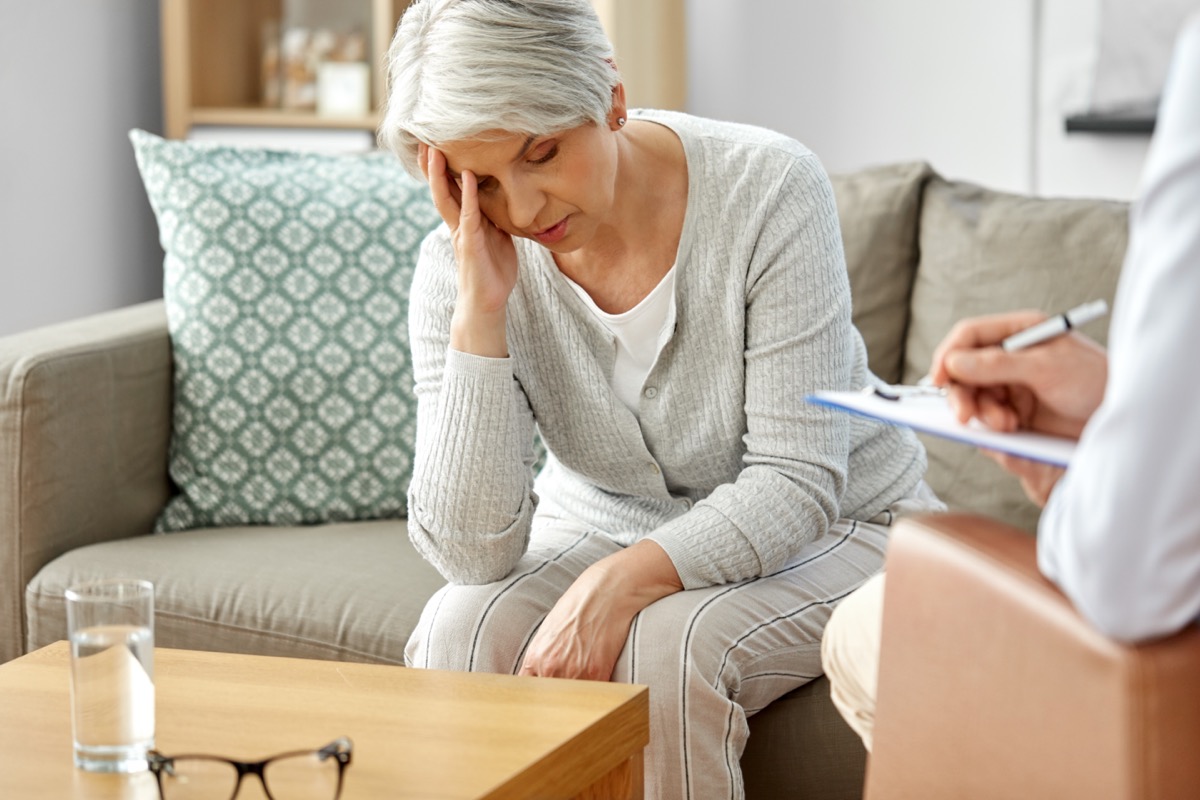Over 60? This Is What Happens to Your Body When You Don’t Sleep Enough

Ignoring your sleep needs is never a good idea, but it’s an especially poor decision past the age of 60. Did you know that science says older adults may benefit even more from a regular set bedtime each night than children? Published in Scientific Reports, the study examined just under 2,000 older individuals (ages 54-93), finding that adults with irregular sleep patterns appear to be more likely to develop a litany of physical health problems such as excess weight, high blood pressure, and higher blood sugar.
The notion of following a strict sleep schedule and bedtime may remind you of your days spent in pajamas surrounded by night lights, but there’s nothing immature about getting enough sleep. One extensive research project published in the scientific journal Sleep and dubbed “the world’s largest sleep study” tracked over 40,000 people all over the world. Researchers concluded no more and no less than 7-8 hours nightly is the ideal amount of sleep regardless of one’s age for optimal physical and brain health.
“We found that the optimum amount of sleep to keep your brain performing its best is between 7 to 8 hours every night and that corresponds to what the doctors will tell you to keep your body in tip-top shape, as well,” explained the lead study author, Dr. Conor Wild.
So what exactly happens to your body when you don’t sleep enough past the age of 60? Keep reading to learn more. And next, don’t miss The Best Walking Tips to Help You Lose Weight After 60.
Higher dementia risk

While there is of course a long list of diseases and ailments we all would like to avoid, dementia is a particularly nasty and devastating condition. Characterized by greatly diminished thinking abilities and extensive memory loss, dementia and Alzheimer’s can rob an individual of their very identity – which in many ways is a whole lot scarier than any physical condition.
If you want to put yourself in the best position possible to avoid dementia, adequate sleep is an absolute essential. One study published in Nature Communications reports adults in their 50s and 60s who habitually sleep less than six hours per night are up to 30% more likely to be diagnosed with dementia years later.
Another research project published in Current Biology finds that sleep quality earlier in life (50s, 60s) can actually serve as a predictor of dementia onset and risk later on. A group of older adults was assessed for this study, and those who dealt with more frequent sleep issues and nighttime awakenings showed a greater buildup of plaque/protein associated with Alzheimer’s in their brains.
“We have found that the sleep you’re having right now is almost like a crystal ball telling you when and how fast Alzheimer’s pathology will develop in your brain,” UC Berkeley neuroscientist Matthew Walker explains. “The silver lining here is that there’s something we can do about it. The brain washes itself during deep sleep, and so there may be the chance to turn back the clock by getting more sleep earlier in life.”
Related: Sign up for our newsletter for the latest health and fitness news!
Weight gain

Sleep may feel like a largely lazy endeavor, but making sure you get enough shuteye can actually help you reach your lean body goals while avoiding putting on any extra pounds. One study published in PLOS ONE examined over 1,600 adults of various ages (19-65) and concluded that less sleep is linked to a greater risk of weight gain. For example, those who reported getting only six hours of sleep per night had larger waists by over a full inch than those sleeping about nine hours nightly.
“Because we found that adults who reported sleeping less than their peers were more likely to be overweight or obese, our findings highlight the importance of getting enough sleep. How much sleep we need differs between people, but the current consensus is that seven to nine hours is best for most adults,” says lead researcher Dr. Laura Hardie from the University of Leeds.
While this work focused on adults of all ages, it’s well documented that it is that much harder to lose weight the older we get. Older adults mindful of their BMIs and waist sizes should be prioritizing sleep.
Related: The Best 11-Minute Exercise Routine to Fight Fat
Greater risk of heart issues

Persistent lack of sleep can also put older adults at greater risk of various heart issues including heart attack, stroke, and cardiovascular disease. One study published in the European Journal of Preventive Cardiology analyzed a dataset of over 100,000 people before concluding various common insomnia symptoms are linked to increased odds of suffering a heart attack or stroke.
“We found that difficulty initiating sleep, difficulty maintaining sleep, or non-restorative sleep were associated with 27%, 11%, and 18% higher risks of cardiovascular and stroke events, respectively,” says first study author Qiao He from China Medical University.
Another research initiative put together by Harvard Medical School and published in the Journal of the American College of Cardiology tracked close to 2,000 middle-aged and older adults (ages 45-84) for up to five years. Sure enough, adults with an inconsistent sleep schedule were found to be over twice as likely to suffer a cardiac event over that five-year period.
Regardless of sleep patterns, high blood pressure is very common among older adults. If you’re over the age of 60 and have hypertension it’s that much more important to attain adequate sleep. One study tracked over 1,000 older (average age 72 years old) adults diagnosed with high blood pressure. Notably, those who failed to sleep at least 7.5 hours nightly were 68% more at risk of heart disease, stroke, and death via cardiac event over a four-year period.
Related: 3 Major Secrets to Living to 100, According to Experts
Depression and “emotional dysfunction”

We can all relate to feeling a bit more irritable when we’re sleep-deprived, but multiple studies indicate lack of sleep can lead to full-on depressive thoughts and feelings. One report published in International Psychogeriatrics examined a group of older adults (ages 55-80) suffering from sleep difficulties as well as depressive feelings to varying degrees. Over the course of a 10-week trial, those who were able to alleviate their insomnia symptoms also experienced less depression.
An additional study published in JMIR Mental Health tracked 208 adults’ daily moods and sleep patterns for six weeks. Sleep quality displayed a major influence on the next day’s mood, especially among subjects who reported generally strong mental health otherwise.
As far as why sleep is so integral to our mental wellbeing, one study released in Sleep discovered that people diagnosed with insomnia displayed much greater activity within their amygdalas while participating in an “emotional regulation task.” In other words, this suggests lack of sleep can make it harder for us to control our emotions.
“Insomnia has been consistently identified as a risk factor for depression,” explains lead study author Peter Franzen, Ph.D., an assistant professor of psychiatry at the University of Pittsburgh School of Medicine. “Alterations in the brain circuitry underlying emotion regulation may be involved in the pathway for depression, and these results suggest a mechanistic role for sleep disturbance in the development of psychiatric disorders.”
For more, check out the Reasons Why You May Not Be Sleeping If You’re Over 60—so you can fix them now.